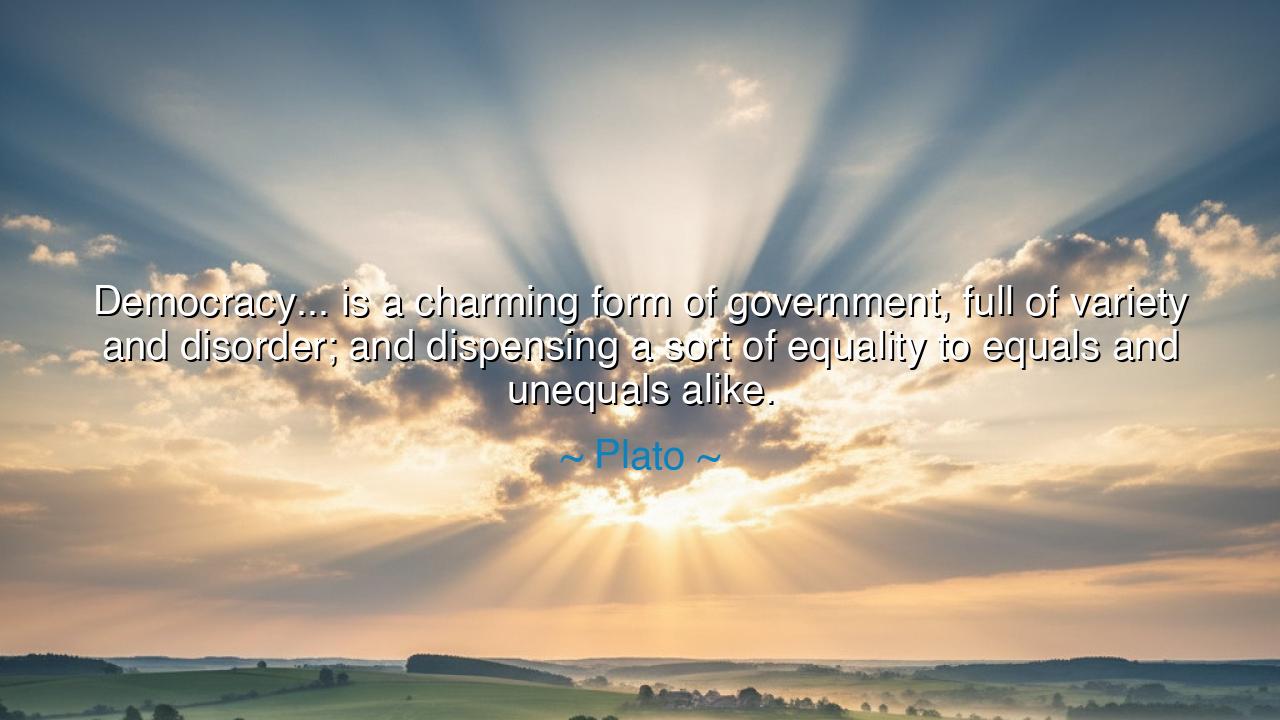
Democracy... is a charming form of government, full of variety
Democracy... is a charming form of government, full of variety and disorder; and dispensing a sort of equality to equals and unequals alike.






When Plato wrote, “Democracy... is a charming form of government, full of variety and disorder; and dispensing a sort of equality to equals and unequals alike,” he was not praising democracy — he was warning of its seductive illusion. These words, taken from his immortal work The Republic, come from one who had witnessed the decline of Athenian democracy with his own eyes. To Plato, democracy was both fascinating and perilous — a beautiful mask worn by chaos, a system where freedom, when unchecked by wisdom, could decay into folly. His tone is not one of mockery, but of lament: that in seeking equality for all, a democracy might forget the difference between virtue and vice, between wisdom and ignorance, between the fit to rule and the unfit to lead.
The origin of this quote lies in Plato’s reflection upon the death of his beloved teacher, Socrates, who was executed by the democratic government of Athens. To Plato, this event revealed the fatal flaw of democracy: that it gives equal weight to all opinions, whether enlightened or ignorant, noble or base. In his eyes, a system that allows the unwise to rule over the wise, or the impassioned crowd to silence the voice of truth, is doomed to destroy itself. And yet, he called democracy “charming” — for it dazzles the senses with its promise of freedom, its music of choice, its bright chorus of diversity. It is the most seductive of regimes because it speaks to man’s desire for liberty — but it is also the most fragile, because it feeds upon his passions, not his reason.
Plato saw variety and disorder not as virtues, but as symptoms of democracy’s decline into moral confusion. In a society where all desires are equal, the pursuit of truth is replaced by the pursuit of pleasure; discipline gives way to indulgence, and the laws, once sacred, are treated as mere suggestions. The citizen grows impatient with authority, the student no longer reveres the teacher, and the people, intoxicated by freedom, begin to despise any form of restraint. From this wild equality, Plato warned, emerges the tyrant — the man who promises to restore order to the chaos that freedom has unleashed. Thus, democracy, in its unchecked form, does not secure liberty forever; it plants the seeds of despotism in the soil of its own excess.
History has often vindicated Plato’s grim foresight. Consider the collapse of the Athenian state after the Peloponnesian War. Once a shining city of learning and democracy, Athens was torn apart by faction, populism, and mob rule. Leaders rose by flattery, not wisdom; policies were guided by passion, not reason. The people, wearied by instability, turned in desperation to demagogues who promised strength, only to find their freedom lost to tyranny. The same cycle has repeated across the ages — in the fall of Rome’s republic, in the rise of totalitarian regimes of the 20th century, and even in modern times when truth itself becomes subject to opinion. Plato’s warning echoes eternally: freedom without virtue is the beginning of slavery.
Yet, his words are not a rejection of democracy, but a call to discipline within freedom. Plato knew that man’s desire for liberty is noble — it is the divine spark that distinguishes him from the beast — but liberty without wisdom leads only to ruin. The challenge, then, is not to abolish democracy, but to elevate it — to ensure that equality does not mean the equal validation of ignorance and wisdom, but the equal opportunity to pursue truth and virtue. The “charming disorder” of democracy can be tempered by education, by justice, and by moral restraint. The task of the citizen is not to worship freedom blindly, but to wield it wisely.
One need only look to modern history to see how this balance can be achieved. The founding fathers of the United States, though inspired by democratic ideals, built their constitution upon Plato’s caution. They created checks and balances, divided power, and placed reason above impulse. They feared the tyranny of the majority as much as that of kings, and sought to build a republic governed by law, not by the whims of passion. In their design lives the spirit of Plato’s lesson — that democracy must be guided by wisdom, or it will consume itself in the very fires of liberty it seeks to kindle.
The lesson of Plato’s words is timeless: freedom is not the absence of order, but the harmony of justice and liberty. Equality is sacred, but it must not be blind; for when the wise and the foolish are treated alike in all things, the foolish will lead the wise into ruin. Let every generation guard against the arrogance of the crowd and the corruption of the demagogue. Let them remember that democracy, though “charming,” is also fragile — a mirror reflecting both the best and worst of mankind.
And so, my children of thought, let this wisdom endure: cherish your freedom, but temper it with virtue; embrace equality, but pair it with discernment. For democracy, though radiant as dawn, can darken into tyranny if its light is not guided by reason. As Plato taught, the fate of every free society rests not in its systems, but in its souls — in the courage of its citizens to be not merely free, but good.






AAdministratorAdministrator
Welcome, honored guests. Please leave a comment, we will respond soon